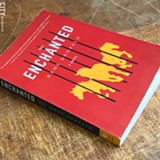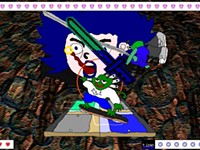[
{
"name": "500x250 Ad",
"insertPoint": "5",
"component": "15667920",
"parentWrapperClass": "",
"requiredCountToDisplay": "1"
}
]
Rene Denfeld's debut novel, "The Enchanted," is not of the mystery genre, but from page one it beckons readers to pursue its glittering secrets through the dark, twisting narrative. The work is one hell of an unconventional prison story that trowels the depths of humanity's horrors. The reward for bearing painful witness to such supreme darkness, though, is that the story also offers a startling, quickening hope for mankind's redemption.
"The Enchanted" is Writers & Books' 2017 pick for its "Rochester Reads" series. Next week, the organization will bring Denfeld to town for discussions, readings, and workshops. If you haven't read the book yet, I sincerely recommend picking it up this weekend.
This is a story about the potential for evolution even in the seemingly most hopeless of places, and locating the worthiness in the most forsaken lives. At the fore, it follows the work of a woman — known only as "the lady" — who has been hired to help a death row inmate escape execution through an investigation of his tragic life.
But the heart of the tale is the wondrous philosophy about the undying human need for connection and the salvation in believing that we are worthy of it.
The bulk of "The Enchanted" is told through the eyes of an unnamed narrator, whose crimes are so desperately terrible that no one can bear to describe them. Speaking directly to us, the man himself won't disclose the worst of it: "As soulless as I am, I do not want others to do what I have done. Some ideas need to stay silent inside me, like the letters inside some words."
"The Enchanted" explores the humanity in the monsters, but also examines the corrupt inner workings of the monstrous place they live. In a passage describing the collusion of guards to allow prison rape, Denfeld writes, "One useful boy is like a lightning rod that moves the prison away from storms."
But Denfeld also transforms a place of cold, helpless horror into a realm of possibility. The narrator's rich imagination factors in as heavily as his eavesdropping and observations. He is an alternatingly mad and lucid poet with a bird's heart beating against his cage.
He sees the lady seeing others: "She says her new client's name. It drops like a gem from her mouth. She has no idea how precious it sounds."
Throughout the book, Denfeld slowly parses the pasts and inner worlds of her characters, including the narrator, a handful of other condemned men, the kindly warden, a fallen priest haunted by his own decisions, and the lady's demons.
On the surface, the lady is strong, kind, honest, and apparently whole. Her depth of understanding is rooted in looking unflinchingly and with compassion, and the world's secrets open to her. But Denfeld has also given the lady an obsession with the dark: "The look in her eyes is of a person who drank from the end of a gun barrel and found it delicious."
Both the lady's talent for seeing into the men and her deep and hungry glances into the abyss come from sharing the inmates' background of poverty, neglect, and abuse. She believes she is broken, but unlike them, she has not broken others. And while her own trajectory diverged from their paths, Denfeld shows the lady is as isolated as the prisoners.
Denfeld writes from her own truth — the novel is informed by her personal history growing up in poverty and abuse as well as by her work with inmates as a death penalty investigator. And like her narrator, Denfeld found salvation in the library.
During his incarceration, the narrator taught himself to read, which has liberated a part of him that can now appreciate beauty. But in doing so, he has also learned empathy. The depth of his reading of others imbues his comprehension with near-omniscience; he sees and tells of their inner lives because he recognizes the common golden thread running throughout each life: the need to be witnessed.
Like the doomed sailor in "The Rime of the Ancient Mariner," the narrator's salvation lies in his act of valuing. He detects and savors magic in the memory of nature, in earthquakes, in the particles of dust that cover his cell. His terror transmutes into mythic beings with vicious and wild or gentle natures.
Over the course of the story, he witnesses the unscathed part of the lady reach out with trepidation to the fallen priest, and the narrator recognizes in himself the stirrings of hope on behalf of another person.
A selective mute, he doesn't — or cannot — share this revelation.
At the very end he lets one person in on this great secret, but not as an appeal, not for his own sake. It's a gift he has grown to be able to offer: redirecting the despair of another onto a pathway of redemption.
Speaking of...
-
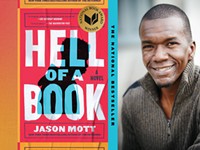
Rochester Reads selection is one 'Hell of a Book'
Jul 26, 2022 -
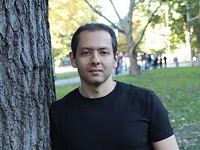
Interview: 'American War' author Omar El Akkad
Mar 19, 2019 -

Rochester Reads 2019 selection: Omar El Akkad’s ‘American War’
Jul 12, 2018 - More »
Latest in Culture
More by Rebecca Rafferty
-
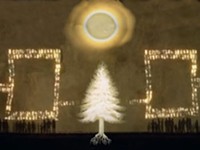
Beyond folklore
Apr 4, 2024 -

Partnership perks: Public Provisions @ Flour City Bread
Feb 24, 2024 -

Raison d’Art
Feb 19, 2024 - More »
